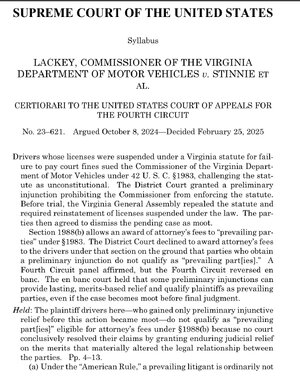On Tuesday, the Supreme Court, in an opinion by Justice Sotomayor , invalidated the murder conviction (and thus also the death sentence) of ...

www.dorfonlaw.org
“On Tuesday, the Supreme Court, in
an opinion by Justice Sotomayor, invalidated the murder conviction (and thus also the death sentence) of Richard Glossip and sent his case back to the Oklahoma courts so that they can either release Glossip or retry him (for what would be his third trial on this charge).
…
According to the dissent, Glossip and the state Attorney General--who agreed that Glossip was entitled to a new trial--colluded to exclude evidence from the record tending to show that the prosecutor at the time did not in fact conceal or mischaracterize evidence regarding Sneed's mental health history.
The dissent based this account on material provided by Professor Paul Cassell, who filed
a brief on behalf of the surviving family members of the victim. Professor Cassell further expounded his view in
an essay this week on the Volokh Conspiracy.
Putting aside the merits, there is a mystery that neither Professor Cassell nor Justice Thomas has solved. Each of them accuses Oklahoma State Attorney General Gentner Drummond of colluding with Glossip to present the Supreme Court with an inaccurate picture of the facts and the record. But they don't explain why Drummond would do such a thing. Indeed, in his brief, Professor Cassell admits that the reasons why Drummond "personally believes that a new trial is warranted" for Glossip are "unclear." Quoting Justice Thomas's dissent in his
Volokh essay, Cassell then says that Attorney "General Drummond still has no explanation for why he 'collusively excluded … highly relevant evidence from the record.'"
There is, however, an obvious innocent explanation. There was no "collusion," only agreement. Perhaps Drummond simply reviewed the record and concluded that Glossip's rights were violated.
… Justice Thomas goes beyond insinuation.
He first impugns the integrity of lawyers hired by "a group of legislators opposed to" Glossip's execution by noting that the lawyers so hired work for a firm that is "publicly committed to 'fighting the death penalty.'" (It appears that Justice Thomas thinks this is discrediting in the way that a commitment to public defecation would be. But I digress.)
Drummond's predecessor as Oklahoma AG did not credit the lawyers' work, but when Drummond took office, he apparently did.
Justice Thomas then impugns the integrity of another lawyer.
He recounts that Drummond "appointed Rex Duncan, a personal friend and campaign donor, as independent counsel to reexamine the legitimacy of Glossip’s conviction." (It's so very heartening that Justice Thomas is concerned about appearances of impropriety when
government officials accept largesse from personal friends. But I digress again.)
Presumably, Justice Thomas expects the reader to think that Drummond appointed his friend and campaign donor Duncan because Drummond wanted an investigator who would reach a pre-determined conclusion that Glossip's trial was marred by constitutional errors that cast doubt on his guilt.
But, again, why? So far as I can tell, neither Professor Cassell, Justice Thomas, nor anyone else has offered any remotely plausible explanation for whyDrummond would deliberately help a murderer escape justice.
Drummond and Duncan are both Republicans. Each has had political differences with some other Oklahoma Republicans, but that's hardly a reason to doubt their integrity.
Meanwhile, Drummond has announced his intention to run for Governor of Oklahoma. Based on his
official bio page, he appears to be quite conservative on immigration, industry regulation, and various other issues. Taking a high-profile stance on behalf of a person convicted of murder is hardly going to benefit him politically. Drummond would thus be likely to do so only if he had some really good reason to take such a stance. …”






